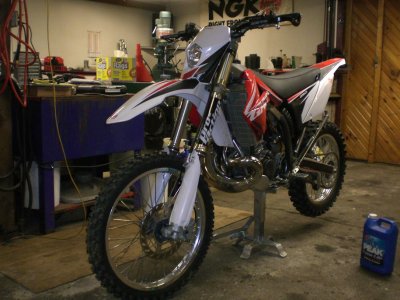You are using an out of date browser. It may not display this or other websites correctly.
You should upgrade or use an alternative browser.
You should upgrade or use an alternative browser.
Are pre 2012 bikes overweight too??
- Thread starter nknudsen
- Start date
andoman
New member
Please do and let us know!
I came off an 08 KTM 300XCW and a '10 KTM 300XC. I'm on an '11 GG 300 6-days. No doubt the gasser is heavier. At least 10 lbs. Probably closer to 15. 20 lbs. heavier wouldn't surprise me. The castings are heavier and the frame just looks heavier.
Here's my comparisons otherwise:
-The Gasser tranny is spaced better than either KTM. The tall first on the XC and too low first on the W drove me crazy.
-The KTM's are a higher quality build.
-The Gasser feels lighter in motion, turns MUCH better, has a more stable and planted feel everywhere and leaves me less fatigued in a long ride.
-I'm faster on the GG.
-The suspension was better out of the box on the KTM's. A moot point because at 140 lbs. and 53 years of age, the first thing I do is send off the suspension on any bike for re-spring and re-valve.
The most moot point is that the lower seat height of the GG puts all the KTM's on the "don't even consider" list.
FWIW, the new Gassers are on the same list...
I thought I could see myself on a new Beta in the future. But my GG is so dialed in and works so well that until there is a MAJOR breakthrough in 2T technology, I'll be staying right where I'm at.
I came off an 08 KTM 300XCW and a '10 KTM 300XC. I'm on an '11 GG 300 6-days. No doubt the gasser is heavier. At least 10 lbs. Probably closer to 15. 20 lbs. heavier wouldn't surprise me. The castings are heavier and the frame just looks heavier.
Here's my comparisons otherwise:
-The Gasser tranny is spaced better than either KTM. The tall first on the XC and too low first on the W drove me crazy.
-The KTM's are a higher quality build.
-The Gasser feels lighter in motion, turns MUCH better, has a more stable and planted feel everywhere and leaves me less fatigued in a long ride.
-I'm faster on the GG.
-The suspension was better out of the box on the KTM's. A moot point because at 140 lbs. and 53 years of age, the first thing I do is send off the suspension on any bike for re-spring and re-valve.
The most moot point is that the lower seat height of the GG puts all the KTM's on the "don't even consider" list.
FWIW, the new Gassers are on the same list...
I thought I could see myself on a new Beta in the future. But my GG is so dialed in and works so well that until there is a MAJOR breakthrough in 2T technology, I'll be staying right where I'm at.
andoman
New member
253 lbs. Minus the 17 lbs. of fuel gives a dry wt. of 236.I'm sure I weighed my kick only model (2010) with a tank of fuel maybe.. at around 115kg. Its no featherweight and felt when lifting. Whats that around 250lbs.
If you had bark busters, skid plate, and heavy duty tubes there's a few more lbs. Heavier than the competition, but not by much.
Jakobi
Super Moderator
bowhunter007
New member
The only things I own that I've never weighed...are dirtbikes. I'm convinced some extra weight is good, as per the "planted feel".
gasser
New member
253 lbs. Minus the 17 lbs. of fuel gives a dry wt. of 236.
If you had bark busters, skid plate, and heavy duty tubes there's a few more lbs. Heavier than the competition, but not by much.
I always thought "dry weight" meant no liquids. Water in the radiators, oil in the transmission, fluid in the forks, shock, clutch, and brake lines will easily add up to 10-12 pounds. Fueled up with all fluids stock gassers (without e-start) were just under 250 pounds in model years 2007-2011. That's under 225 pounds "dry weight" which is almost exactly what the factory claimed. Earlier years like my 2001 gasser were 5-7 pounds heavier (half that extra weight was in the wheels alone).
Water in the radiators, oil in the transmission, fluid in the forks, shock, clutch, and brake lines will easily add up to 10-12 pounds.
No they don't. Assuming 7 lbs for a gallon of all these fluids, your theory means that there is around 1.5 gallons in all those fluids total. There just isn't.
I always thought dry weight meant no fuel. If the process is performed by the manufacturer, then that number is sent to the marketing department where they apply a correction factor to produce an impressive looking number for the brochures.
Go pour a gallon of antifreeze in your GG cooling system and let me know if it all fits.
You can't subtract 10-12 lbs from a bike for fluids - there is a quart in the trans, just over a quart in the forks, and a few ounces for hydraulic fluids and lets say a pint of shock oil. Add all those together, and it's under 3 quarts. 7 lbs/gal x .75 = 5.25 lbs. The rest would have to be coolant.
This is assuming that dry weight is calculated without any fluids, which I disagree with. Dry weight should be without fuel, but some manufacturers just make up numbers on the spec sheet to look better against other brands.
TwoWheels, where's your certified scale and a 2014?
You can't subtract 10-12 lbs from a bike for fluids - there is a quart in the trans, just over a quart in the forks, and a few ounces for hydraulic fluids and lets say a pint of shock oil. Add all those together, and it's under 3 quarts. 7 lbs/gal x .75 = 5.25 lbs. The rest would have to be coolant.
This is assuming that dry weight is calculated without any fluids, which I disagree with. Dry weight should be without fuel, but some manufacturers just make up numbers on the spec sheet to look better against other brands.
TwoWheels, where's your certified scale and a 2014?
Bandit9
Platinum Level Site Supporter
Go pour a gallon of antifreeze in your GG cooling system and let me know if it all fits.
You can't subtract 10-12 lbs from a bike for fluids - there is a quart in the trans, just over a quart in the forks, and a few ounces for hydraulic fluids and lets say a pint of shock oil. Add all those together, and it's under 3 quarts. 7 lbs/gal x .75 = 5.25 lbs. The rest would have to be coolant.
This is assuming that dry weight is calculated without any fluids, which I disagree with. Dry weight should be without fuel, but some manufacturers just make up numbers on the spec sheet to look better against other brands.
TwoWheels, where's your certified scale and a 2014?
In the industry, dry weight is without any fluids. Not just fuel, but without all the other fluids.
pscook
Platinum Level Site Supporter
In the industry, dry weight is without any fluids. Not just fuel, but without all the other fluids.
Isn't it a calculated number based on the composition of the individual components? Assembly fluids (lubricants and loctite) are excluded as well, I believe. I don't believe they weigh an article, they simply add up the pieces as designed, so manufacturing deviations aren't captured. Like if it takes a little extra welding wire in a certain spot, or a casting has a flaw, or a tire is a little thicker than designed.
Bandit9
Platinum Level Site Supporter
I will also add that every company has it's own method of how they want to do it. There is no "industry standard". For ex, Yamaha goes with full wet weight. including full tank of fuel. In general though, if you ask most people like dealers, racers, company reps, "dry weight" means to them, fully assembled without any fluids. Zero. No fork fluid, brake, tranny, engine oil, coolant, maybe even no grease in bearings, etc...
I have never heard of any OEM wieghing individual compents to use as a weight claim for specs. I'm sure they do, I've just never heard or read about it being done like that.
I have never heard of any OEM wieghing individual compents to use as a weight claim for specs. I'm sure they do, I've just never heard or read about it being done like that.
Last edited:
nknudsen
Member
I finally got around to weighing my 2000 GG. It weighed 244-245lbs on the race car scales. Bike info= EC250, transformation kit, KYB forks, radiator guards, skid plate, hand guards, Scotts shark fin, FMF Gnarly, 140 rear Michelin, minimal coolant & fuel.
Attachments
Bandit9
Platinum Level Site Supporter
I finally got around to weighing my 2000 GG. It weighed 244-245lbs on the race car scales. Bike info= EC250, transformation kit, KYB forks, radiator guards, skid plate, hand guards, Scotts shark fin, FMF Gnarly, 140 rear Michelin, minimal coolant & fuel.
Yeah, that is what they should weigh. How much fuel was in it? Kind of important.
Similar threads
- Replies
- 12
- Views
- 2K
- Replies
- 4
- Views
- 149


